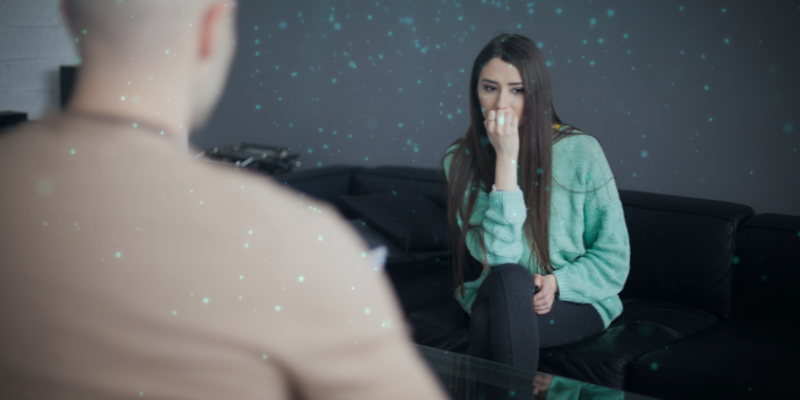
Anxiety can feel overwhelming. Depression can be crushing. Even worse, it is possible to have both anxiety and depression at the same time, creating a double dose of psychological pain. In fact, it’s not unusual to suffer from both of these conditions. The Anxiety & Depression Association of America reports that nearly one-half of those diagnosed with depression are also diagnosed with an anxiety disorder, making these commonly co-occurring concerns. Read on to discover the telltale signs and symptoms of each condition to see if you may have this challenging combination, what functional brain imaging shows about this duo and healthy ways to help you manage it.
Anxiety can feel overwhelming. Depression can be crushing. Even worse, it is possible to have both anxiety and depression at the same time, creating a double dose of psychological pain. Click To TweetANXIETY AND DEPRESSION SYMPTOMS
People who have both anxiety and depression experience a combination of the following signs and symptoms associated with each disorder.
Anxiety symptoms include:
- Frequent feelings of nervousness or anxiety
- Panic attacks
- Avoidance of people or places due to a fear of having anxiety or panic attacks
- Physical symptoms, such as headaches, sore muscles, and trembling hands
- Periods of heart-pounding, nausea, or dizziness
- Tendency to predict the worst
- Multiple persistent fears or phobias (such as dying or doing something crazy)
- Conflict avoidance
- Excessive fear of being judged or scrutinized by others
- Being easily startled
- A tendency to freeze in anxiety-provoking or intense situations
- Shyness, timidity, and getting easily embarrassed
- Biting fingernails or picking skin
Meanwhile, depressive symptoms include the following:
- Persistent sad or “empty” mood
- Loss of interest or pleasure in activities that are usually enjoyable, including sex
- Restlessness, irritability, or excessive crying
- Feelings of guilt, worthlessness, helplessness, hopelessness, and/or pessimism
- Sleeping too much or too little, early-morning awakening
- Loss of appetite and/or weight loss, or overeating and weight gain
- Fatigue, decreased energy, and feeling “slowed down”
- Thoughts of death or suicide, or suicide attempts
- Difficulty concentrating, remembering, or making decisions
- Persistent physical symptoms that do not respond to treatment, such as headaches, digestive disorders, and chronic pain
- Constant negativity or chronic low self-esteem
- Persistent feelings of dissatisfaction or boredom
Although symptoms of either condition may rise to the forefront at different times, both groups of symptoms are present on a regular basis in people who have both anxiety and depression.
ANXIETY AND DEPRESSION IN THE BRAIN
Functional brain imaging can be helpful in understanding if a person has both anxiety and depression. The brain SPECT imaging work at Amen Clinics has helped identify 7 types of anxiety and depression. Each type is associated with specific blood flow patterns in the brain.
The brain SPECT scans of people with Type 1: Pure Anxiety show high activity in the basal ganglia—structures that integrate feelings, thoughts, and movement, and play a role in motivation. The basal ganglia also help to set the body’s idle and anxiety level. High activity in this brain region is associated with anxiety.
The SPECT scans of people with Type 2: Pure Depression show increased activity in the deep limbic system, which is the brain’s emotional center.
When people have symptoms of both conditions and there is excessive activity in both the basal ganglia and the deep limbic system, it is associated with Type 3: Mixed Anxiety and Depression.
MANAGING MIXED ANXIETY AND DEPRESSION
Especially when Mixed Anxiety and Depression are left untreated, it’s not unusual for people with these co-occurring disorders to take treatment into their own hands through harmful choices—for example, self-medicating with toxic substances that calm the brain, such as alcohol or marijuana.
Fortunately, there are healthier ways to cope. First, when feeling anxious or depressed, identify and challenge the automatic negative thoughts (ANTs) that are worsening these problems. Ask yourself if the thought is 100% true. There’s a good chance it won’t stand up to scrutiny.
Then, throughout the day, incorporate wellness-enhancing habits to help keep the symptoms of anxiety and depression at bay. Try spending 10 to 20 minutes each day in meditation—this simple step can improve your mood by calming stress and anxiety, which often lead to symptoms of depression. (New to meditation? Try these 3 calming practices.) In addition, getting regular exercise is a great way to discharge anxious energy and clear the mind. Physical activity can also boost brain health and provide a release of endorphin hormones, which help lift your mood.
DIAGNOSING AND TREATING MIXED ANXIETY AND DEPRESSION
Because Mixed Anxiety and Depression are complex conditions, and because each of the 7 types of anxiety and depression can create many overlapping symptoms, it can be very difficult to get an accurate diagnosis without looking at the brain. Furthermore, with so much variation in brain function, there isn’t a one-size-fits-all treatment that will work for everyone—and what is helpful for one type may worsen symptoms for another type. Customized treatment ensures that each person reaps the best possible results.
Without treatment, Mixed Anxiety and Depression can significantly disrupt the personal, professional, social, and occupational aspects of a person’s life. In fact, untreated anxiety and depression are associated with higher incidences of:
- Substance abuse
- Sleep problems
- Concentration issues
- Relationship problems
- Work issues
- Heart disease
- Physical ailments (colds, flu, and more)
- Suicidal thoughts and behavior
The good news is, with the right diagnosis and a personalized treatment plan, people suffering from Mixed Anxiety and Depression can overcome their symptoms and have healthier, happier, and more fulfilling lives.
Anxiety, depression, and other mental health issues can’t wait. At Amen Clinics, we’re here for you. We offer in-clinic brain scanning and appointments, as well as mental telehealth, remote clinical evaluations, and video therapy for adults, children, and couples. Find out more by speaking to a specialist today at 888-288-9834 or visit our contact page here.





Yes I experience both symptoms , for years will occur ounce some thing will trigger , can not rationalize the fear.
Comment by Patrick nee — February 11, 2022 @ 3:48 AM
Thank you. The comment about asking yourself if it’s 100% true is very helpful.
Comment by Diane Conroy — February 11, 2022 @ 6:56 AM
Having anxiety/depression I’m quite familiar with the symptoms but what really interested me and answered a lot of questions is the physical ailments that can go along with the psychological! Thank you Dr Amen! 🙏🏽
Comment by Steve Boldt — February 11, 2022 @ 8:39 AM
Wonderful information
Comment by Wendy H. Barrios — February 11, 2022 @ 9:31 AM
I have relapsed on OCD medication and this is the 2nd time. What can I do , at the present time ,I am weaning off Anafranil( terrible side effects) . I am on Cymbalta ,60mg and .25mg Xanax one at night and 1 in the morning.
The OCD is not improving much.I am stuck with questionings on my mind, regarding an ex boyfriend who i have not seen for years. and who I was not thinkinof too, but these thoughts with weird questionings came up in my mind and ha e stuck. Can you advise me how to get this off my mind, I cannot ask these questions because it seems weird.
Comment by Radha Persad — February 11, 2022 @ 10:29 AM
Can you do an article on treating agoraphobia?
Comment by MJ — February 11, 2022 @ 11:06 AM
Where are you located? Can I do a brain scan locally and have you evaluate it . Then do tella health. Can you prescribe meds or is that a different doctor. Finally do you take insurance
Thank you
Comment by Lillian saltzman — February 11, 2022 @ 1:55 PM
This article is very helpful. Keep sending these articles. I alway read them.
Comment by Mary C Dermody — February 12, 2022 @ 9:28 AM
What if your ANTS are hurtful negative things people have said to you throughout your life and they replay again and again like knives? This fills you with self loathing and you dont want people to know you.
Comment by Adelia Hitt — February 12, 2022 @ 9:51 AM
Hello Lillian, thank you for reaching out. We’d be happy to contact you directly with more information. Currently we have 10 clinics nationwide: https://amenclinics.com/locations/. We look forward to speaking with you!
Comment by Amen Clinics — February 15, 2022 @ 1:30 PM
Hello MJ, we have two articles for you to take a look at:
https://amenclinics.com/blog/do-you-know-the-mental-and-physical-symptoms-of-agoraphobia/
https://amenclinics.com/blog/when-does-staying-at-home-slip-into-agoraphobia/
Comment by Amen Clinics — February 15, 2022 @ 1:31 PM
Husband o 68 years died. Have Ben very depressed and ave bad anxiety attacks. Can’t go anywhere. Psychiarst not helping wha todo.
Comment by Maryanne lambert — February 16, 2022 @ 10:01 AM
Hello Maryanne, thank you for reaching out. Sorry to hear about your situation and your husband. We would be happy to contact you directly with more information regarding scheduling an appointment at 1 of our 9 clinics open across the US. We look forward to speaking with you soon.
Comment by Amen Clinics — February 17, 2022 @ 11:41 AM